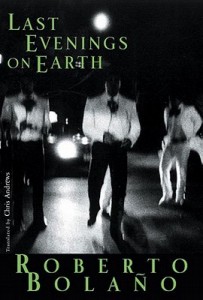
Storytelling from Afar
The first scene in the story is the most shocking but it remains distant. Bolaño hinted at menace behind Fred’s motives as he drove the girls around town and to his parents’ house and we see later that there was in fact danger, his parents were dead and not likely from natural causes. By throwing in phrases such as “According to what Anne told me,” the author separates the reader from the material just enough that it was difficult for me to engage with the characters. There is ample tragedy in this story as Anne flounders through relationships, prostitutes herself and disappears and her sister becomes a suicidal alcoholic, but Bolaño left me with the sense of resignation rather than desperation on the part of the characters, especially Anne. Because Anne wasn’t fighting for her own life and I didn’t know her, I wasn’t interested in fighting for her.
Bolaño writes about a similar sense of remove on Anne’s part as she overhears a conversation between Susan and Paul. “Anne remembers that there was something oddly artificial about this conversation between her lover and her sister, as if they were assessing the plot of a film, not something that had happened in real life.” As a reader, I also felt like I was watching someone assess a plot and part of it was how Bolaño’s narrator kept interrupting the story with “Anne remembers” and “says Anne.” Over and over again he pulled me out of the story and presented it to me as a tableau instead of letting me experience it.
Specific and Sexual Detail
Bolaño gives only the sparsest detail when he does go into scene, and those details are often carnal or hint at carnality. They start out as sexual: “a very bright red nightgown,” hotel walls “made of meat,” the red dress and shoes of Anne the prostitute, pornographic films where “men always ejaculated onto, rather than in, their partners,” and gradually become more medical but less descriptive: “doctors diagnosed a serious illness” and then her relapse. Bolaño wet my appetite for anything to happen with the rawness of some of the earlier descriptions and by playing down the seriousness of the illness, he left me wide open for Anne’s response to Bill’s suggestion that they have a child: “inside she could feel herself starting to scream, or rather, she could feel, and see, the dividing line between not screaming and screaming. It was like opening your eyes in a cave bigger than the Earth” the very next phrase is again the distancing “Anne remembers.”
The distance is clearly intentional on Bolaño’s part. In “Mauricio (‘The Eye’) Silva,” Bolaño again summarizes nearly the entire story. However, as a reader, I felt engaged with The Eye. I wanted to know more about him, and I cared what happened to him. Perhaps it is because The Eye is introduced more sympathetically: he “always tried to avoid violence” or because the author states “The case of The Eye is paradigmatic and exemplary.” In either case, Bolaño allowed me to relate to The Eye in a way I could not with Anne.
Is it because Anne is North American and The Eye Chilean? I don’t know why Bolaño put Anne at such a distance from the reader, but she does come off as an oddity, someone belonging in a jar on a shelf.
Writing in Summary
Summary is a tricky business. Beginning writers are often advised to dramatize, dramatize, dramatize, but there is a place for summary in writing. It is the place of transitions, of time passing, of the narrator. Bolaño’s lack of scene makes his stories feel more like a story told in a bar or beside a fire and it makes the reader more intimate with the narrator that with the protagonists. I love to write in summary, but this collection of stories made me more cautious because my own writing isn’t as “let me tell you a story” as Bolaño’s and in comparison I could come off as didactic. However, that chum in a bar style did open my eyes to a new way of writing summary where the interaction between reader and narrator is almost as intimate as the reader interpreting a scene. I would like to cultivate some of that intimacy.
If this review made you want to read the book, pick up a copy of Last Evenings on Earth from Bookshop.org. Your purchase keeps indie booksellers in business and I receive a commission.





Leave a Reply